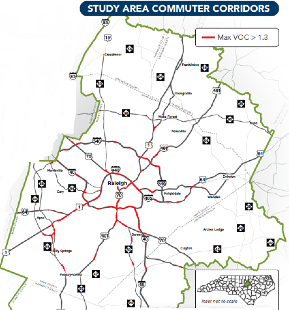Commuter Corridors Study
Background 
Multi-modal commuter corridors in the region are increasingly congested even with major financial investments (TIP, MTP, Wake County Transit Plan projects) into the area’s transportation network. The Commuter Corridors Study worked to explore, in detail, the anticipated volumes on major corridors across the region, even with the planned transportation improvements included in the 2045 Metropolitan Transportation Plan as well as major investments in the transit network that may help to mitigate some of the anticipated growth in traffic.
This study worked to forecast what the outcomes could be if certain, purposely drastic and hypothetical, improvements or adjustments were made to the region's network. These hypothetic scenarios ranged from the expansion of highways, or additional tolled roadway facilities, to an increase in telecommuting and mobile workers. Each scenario was modelled in isolation to gain a fuller understanding of what the potential impact could be.
The Commuter Corridors Study consisted of a technical analysis of some of the region’s major commuter corridors to identify what cross-sections are ultimately needed to serve anticipated volumes through 2050. By looking at different hypothetical scenarios, this study will help inform which projects to prioritize, and during which decade, during the development of the 2050 Metropolitan Transportation Plan.
Timeline
The study took place in 2018-2019. The final report (below) will be submitted to the Executive Board at the Executive Board meeting on February 19, 2020.
